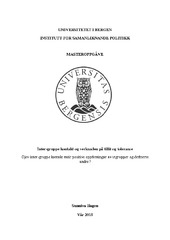| dc.contributor.author | Hagen, Sunniva | eng |
| dc.date.accessioned | 2015-08-04T12:07:54Z | |
| dc.date.available | 2015-08-04T12:07:54Z | |
| dc.date.issued | 2015-06-02 | |
| dc.date.submitted | 2015-06-02 | eng |
| dc.identifier.uri | https://hdl.handle.net/1956/10205 | |
| dc.description.abstract | Auken i etnisk og sosialt mangfald har samstundes auka kontakt mellom etniske grupper, som vidare er venta å auke også i framtida (Sturgis, Brunton-Smith, Read og Allum 2010: 58). Kunnskap om verknadane av inter-gruppe kontakt er difor viktig. Denne masteroppgåva undersøker verknaden av inter-gruppe kontakt i Noreg på individnivå, og kva som skjer når medlemmar frå ulike grupper kjem i kontakt i same geografiske område. Kontakt, i form av samansetning og kontaktkvalitet, blir undersøkt med fokus på ulike utfall som i litteraturen er relatert til mangfald og kontakt. Med bakgrunn i dette vil eg i oppgåva svare på følgjande forskingsspørsmål: Kva verknad har inter-gruppe kontakt på uttrykk for toleranse og tillit i høve utgrupper i Noreg, og varierer verknadane ut frå mengde og type kontakt? Det teoretiske rammeverket har bakgrunn i to motståande teoriar: kontakt- og konfliktteori. Sjølv om desse teoriane ynskjer å forklare det same, effektane av inter-gruppe kontakt, finn dei ulike resultat. Medan kontakttesen viser til at kjennskap verkar positivt på haldningar til utgrupper ettersom det minkar fordommar og aukar tillit, sosial og politisk toleranse, syner konfliktteori negative effektar av inter-gruppe kontakt gjennom auka trusselpersepsjonar (Putnam 2007). For å svare på forskingsspørsmålet nyttast datamateriale frå Norsk medborgarpanel (2013), som blir analysert ved ordna probit-regresjon. Resultata indikerer at inter-gruppe kontakt har ein positive effekt på ulike uttrykk for toleranse når kvaliteten på kontakta er god. Ved positive evalueringar av kontaktsituasjonar, samt gjennom venskapleg kontakt kan uttrykk for toleranse endrast til det betre. Jamvel peikar effektane av samansetning på negative verknader av kontakt. Del innvandrarar i nærområdet har med dette potensiale til å auke trusselpersepsjonar. Dei positive effektane av kontaktkvalitet er likevel det som fører verknaden av inter-gruppe kontakt i oppgåva. Resultata avhenger likevel i ein viss grad av kva uttrykk for tillit og toleranse som vert studert. | en_US |
| dc.description.abstract | Due to the increase in ethnic and social heterogeneity in advanced countries, inter-ethnic group contact has increased in Norway, and is also expected to increase in the future. Even though the effect of intergroup contact has long been a question central to social scientists, understanding intergroup contact is increasingly important to both scientific and policy debates as social changes bring increased diversity (Putnam 2007, Enos 2014: 1). This thesis examines the effects of intergroup contact in Norway at the individual level, and what happens when members from different groups get in contact in the same geographic area. The effects of contact are being studied with regard to a variety of outcomes embedded in the theoretical framework of contact theory and the opposite perspective, conflict theory. Contact theory argues that intergroup contact has the potential of giving positive effects on tolerance and trust towards outgroups. Nevertheless, diversity and intergroup contact are also found to have negative effects by increasing perceptions of threat and conflict. Building on this framework different effects of contact are being studied with regard to different expressions of tolerance and trust: attitudes towards outgroups, motivation to avoid prejudices and generalized trust. The research question will be examined by using data from the Norwegian Citizen Panel (2013), assessed through the use of ordered probit-regression. The results indicate that intergroup contact has positive effects on expressions of tolerance when the quality of the contact is good. In situations where the contact situation is perceived as positive and has a friendship potential" intergroup contact can change expressions of tolerance for the better. However, the compositional effects of contact do not reveal the same results. The compositional effects indicate that having more immigrants living in the neighbourhood have the potential of increasing perceptions of threat and conflict. The positive effects of quality of contact are still driving the effects of intergroup contact in the analysis. Still the effects of intergroup contact depend somewhat on which dependent variable that are being studied. | en_US |
| dc.format.extent | 1733041 bytes | eng |
| dc.format.mimetype | application/pdf | eng |
| dc.language.iso | nno | eng |
| dc.publisher | The University of Bergen | eng |
| dc.rights | Copyright the Author. All rights reserved | eng |
| dc.subject | social heterogeneity | eng |
| dc.subject | ethnic heterogenity | eng |
| dc.subject | inter-ethnic group | eng |
| dc.subject | compositional effects | eng |
| dc.subject | minoritetsbefolkning | eng |
| dc.subject | kontaktteori | eng |
| dc.title | Inter-gruppe kontakt og verknaden på tillit og toleranse. Gjev inter-gruppe kontakt meir positive oppfatningar av utgrupper og definerte andre? | eng |
| dc.type | Master thesis | en_US |
| dc.description.version | publishedVersion | |
| dc.description.degree | Master i Sammenliknende politikk | |
| dc.description.localcode | SAMPOL350 | |
| dc.description.localcode | MASV-SAPO | |
| dc.subject.nus | 731114 | eng |
| fs.subjectcode | SAMPOL350 | |
